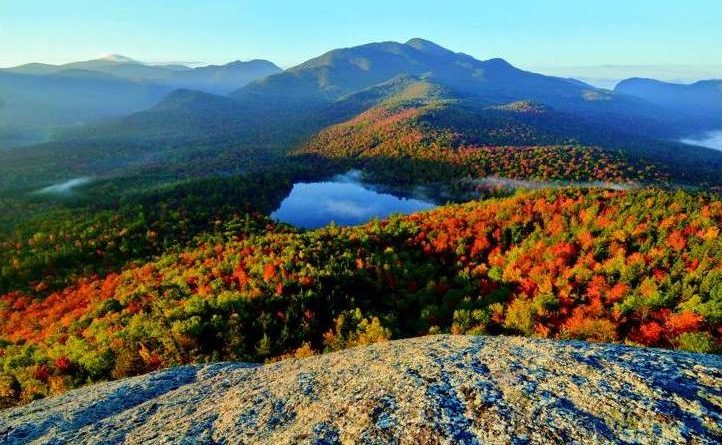4 Hidden Huts for Foliage Season
If you want to escape the crowds, four new hidden huts will make you feel at home in the mountains.
When I lived in California, often I would wake up to find I had been dreaming of New England mountain huts wrapped in fall mist.
The Eastern Sierra are literally the biggest mountains in the lower 48. Like New Hampshire’s White Mountains, they are granite behemoths that rise out of the landscape they define like a spine. They are jagged in their adolescence, and they inspire equal parts adventure, fear and awe.
But they are not misty. They don’t reveal themselves slowly the way the Appalachian mountains do. They stare you down and dare you to defy them.
Coming home to Vermont always included an annual pilgrimage to Carter Notch Hut. I even worked one fall there as part of a hut “croo” for the Appalachian Mountain Club (in addition to a summer in college). Every time I returned, as I crested the notch on Nineteen-Mile-Brook Trail and the first pond came into view, it felt like coming home.
Mountain huts will do that to you. It’s inspiring to imagine the adventurers who frequented them before you. And there is nothing like opening a cabin door on a rainy day to find yourself in a shelter, warm, among friends, miles from the closest road, taking refuge together.
That said, hiking in fall foliage season can be an exercise in patience. Everyone takes to the trails for the cooler temperatures, three-day weekends and magnificent foliage. And that is often reflected in the availability (or rather lack-thereof) of popular backcountry. In other words, if you haven’t booked a hut yet, you might consider yourself out of luck.
Or not. In the last two years, four huts have been built or newly renovated and remain off the beaten track. In Vermont, the Nulhegan Hut and Chittenden Brook Hut both opened for reservations this year. Northern Maine’s Medawisla Lodge opened in the fall of 2017, and the Tyler Cabin, part of the Heart Lake Cabins near Lake Placid, N.Y. in the Adirondack State Park, reopened for reservations in 2016 following renovations.
At these backcountry huts, there is a real feeling of belonging. The lingering finality of summer amplifies that.
So this fall, pack your book, leave your tent, ditch the crowds, and find your way to one of these hidden huts.
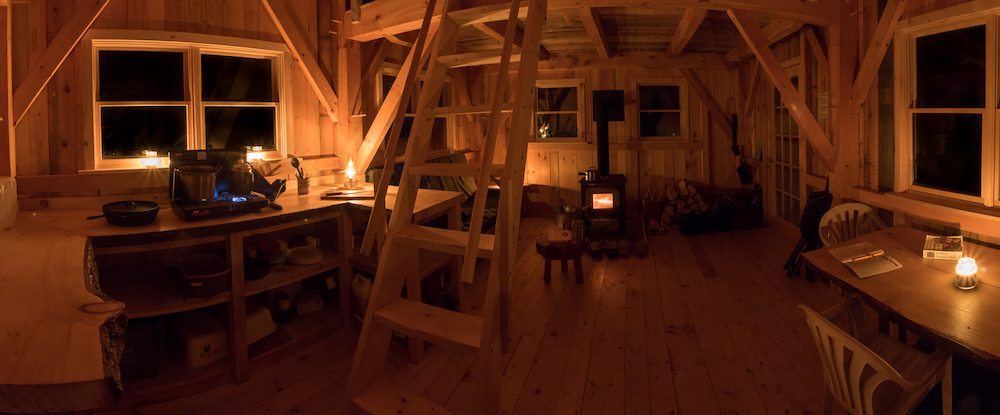
The Nulhegan Hut and Trails, Bloomfield, VT
Far in the northeast corner of the state, Nulhegan Basin is one of the wildest, most remote places in Vermont. Its rich logging history left huge swaths of undeveloped land latticed with miles and miles of old dirt logging roads and trails.
You can book a night at this remote cabin now through the Vermont Huts Association. Located at the confluence of the Nulhegan and its East Branch, three miles before it joins the Connecticut River, it’s open year-round and is a great place to catch early fall foliage.
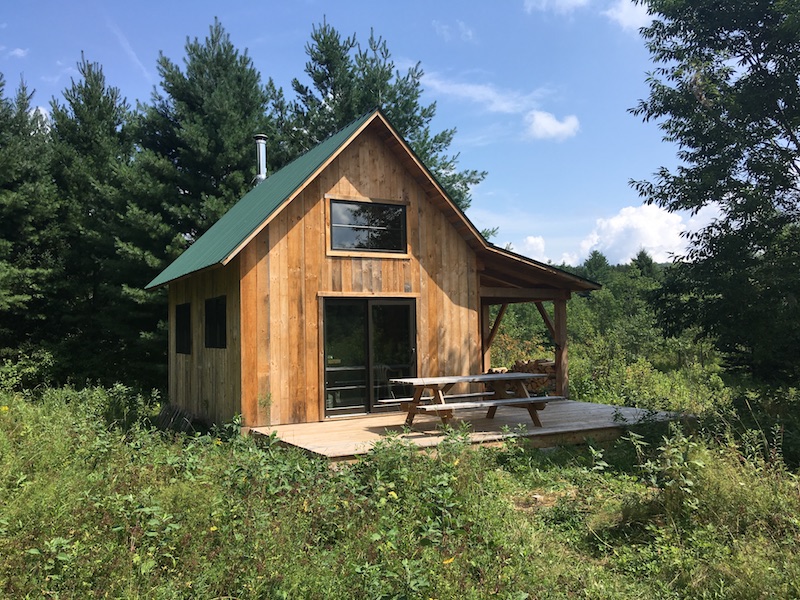
Traveling there is like a trip back in time. What Noah Pollock of Vermont River Conservancy calls Vermont’s wildest river, the Nulhegan has never been dammed and never will be. Ninety percent of its tributaries are protected through public land or conservation easements. Fall mornings in the basin are misty, and the surrounding forests have a boreal feel that imbues coziness.
The insulated 14- by 18-foot timber-framed cabin is on the river, a 300-yard walk from the road and lies on a 70-acre parcel of conserved land. The hut is outfitted with a wood stove and sleeps six. Propane and cooking implements are supplied, but guests should be prepared to treat their own water.
For paddlers on the Northern Forest Canoe Trail, the hut is a perfect stop. There’s also a 1.5-mile walking trail and hundreds of miles of gravel roads perfect for a gravel bike. While this fall the river may be too low to paddle from the hut, a one-mile stretch of the Nulhegan just upstream called the Nulhegan Gorge becomes a nice class III rapid from April to June. “You could run laps and have a fire waiting,” suggests Pollock. You can also fish for wild brook trout on the Black Branch, a mile upstream of the hut. Above the gorge lie three miles of flatwater paddling. In the winter, bring your skis for cross country skiing on the many miles of neighboring dirt roads and trails.
Rates are $25 per person per night and $75 per night for the whole hut. Visit vermonthuts.org for information and reservations.
Chittenden Brook Hut, Chittenden, VT
Imagine taking a trail through a wooded knoll to arrive at a backcountry hut complete with a furnished kitchen, common room, wood stove and porch. Maybe you hiked 1.8 miles off the Long Trail to get there, or maybe you arrived by mountain bike via a section of the proposed Velomont Trail.
This is the new Chittenden Brook Hut, owned and operated by the Vermont Huts Association on Green Mountain National Forest land near Chittenden Brook Campground off Brandon Gap. The campground offers access to a 7.5-mile network of trails designed for hiking in the summer and cross-country skiing in the winter.
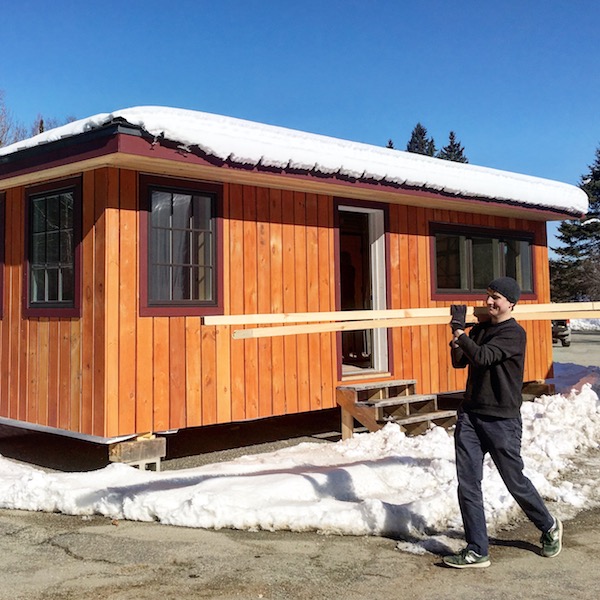
In the winter, the new hut is also a 2.5-mile skin or snowshoe from the Rochester and Randolph Area Sports Trail Alliance’s (RASTA) Brandon Gap Backcountry Recreation Area, which features cut glades for backcountry skiing.
The access road is closed to vehicles in the winter, but open during the summer and fall, which makes the ADA compliant building accessible to just about everyone.
“Imagine getting out of work on a Friday night and skinning the 2.3 miles up to the hut under the moonlight. The next morning, you make breakfast, skin up the Chittenden Brook Trail, get on the Long Trail heading north for a jaunt, and you’re on top of the terrain that RASTA created with the National Forest,” said RJ Thompson, Executive Director of the Vermont Huts Association, adding that glade development immediately above the hut is being considered as part of the Velomont Trail review process.
The hut was installed in fall of 2018 and opened to visitors last December. Students at the Yestermorrow Design/Build School put final touches on details like hand-carved trim on the building’s exterior and a panoramic mountain decal on the built-in reading nook.
The hut is open to the public for reservations year-round through Vermont Huts Association. Member rates from the second Monday in October to Memorial Day are $110 per weekday night and $155 per weekend night. During the summer, the cabin can be rented for $135 per weekday night or $175 per weekend night. But be sure to book early for the winter—last season, the hut was booked up quickly. Reservations at vermonthuts.org
For more about skiing into Chittenden Brook Hut in the winter, see this story from our sister publication, Vermont Ski + Ride Magazine.
Medawisla Lodge & Cabins, Second Roach Pond, ME
If you are looking for a truly remote, old fashioned great camp experience that offers great food and comfortable lodging in a truly wild setting, Medawisla Lodge and Cabins deep in central Maine’s north woods, is the place.
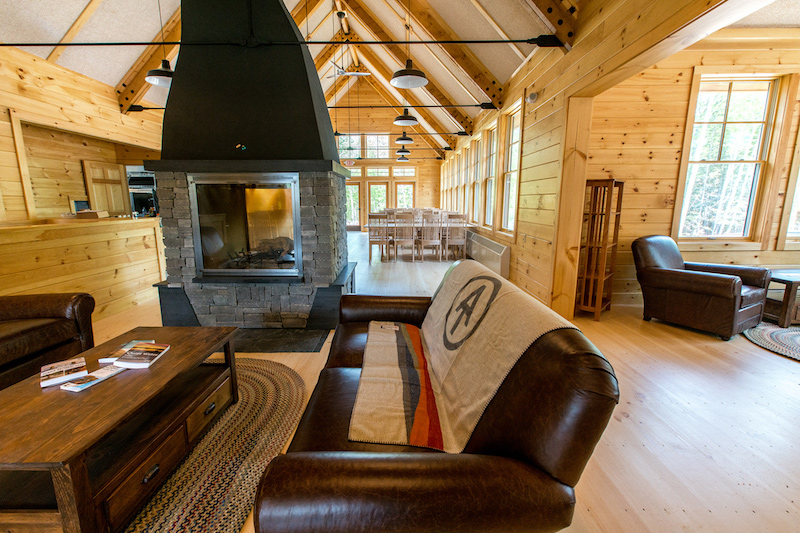
In 2006, the Appalachian Mountain Club purchased the original camp, which was comprised of seven cabins built in 1953. Over the following eleven years, the organization conserved the surrounding 70,000 acres of forest and restored the camp, reopening it to visitors in 2017 with nine cabins, two bunkhouses, a lodge and a sauna, all on the shores of Second Roach Pond.
The camp, which is off the grid, is accessed by car, and every cabin is heated with a wood stove. In the summer, canoes, kayaks and SUPs are available for guest use. Second Roach Pond offers great fly fishing for wild brook trout and landlocked salmon.
In the winter, guests have access to 30 miles of groomed cross-country ski trails (80 if you count the network that leads to the AMC’s other Maine lodges, Little Lyford and Gorman Chairback), which become a running and hiking trail system in the summer and fall. In the summer, mountain biking is allowed on the surrounding logging roads. There are also guided naturalist trips, stargazing programs and campfire conservation chats.
Cabin interiors feature exposed wood walls and rustic furnishings. Beds are made and linens are provided. All visitors are welcome to spend time in the lodge, which has a big fireplace and sitting room, deck and sauna. Bunkhouse visitors bring their own linens. Some of the cabins are ADA accessible.
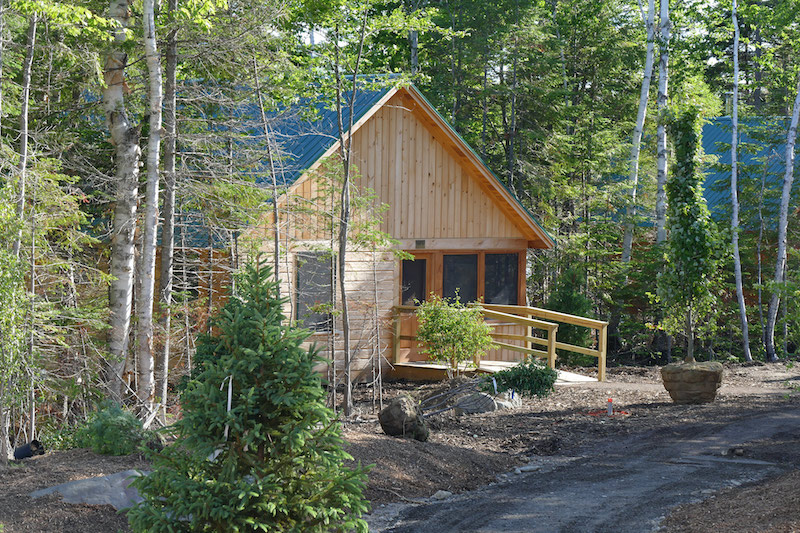
Full service stays in cabins and bunkrooms are available year-round and include breakfast, a trail lunch and dinner. Full-service nightly rates for AMC member adults range from $80-$183 in September, and $99-$219 for non-member adults. Self service is available from May 10 through November 26 in bunkhouses and May 10 through Sept. 30 in the Waterfront Cabins. A night in a self-service bunkhouse in September is $55 for members and $66 for non-members, and a night in a self-service Waterfront Cabin is $75 per member adult and $90 per non-member adult. For reservations, visit outdoors.org.
The Heart Lake Camps, Lake Placid, NY
Fall in the Adirondacks comes swiftly, and there is no better place to watch peak foliage erupt from the mountainsides than the shores of a lake. At the Heart Lake Camps, you can start your morning at the lakeshore and end it on one of the High Peaks, without ever getting back in your car. Popular fall hikes from these camps include the two-mile jaunt up Mount Jo, the one-mile Heart Lake Trail, which goes around the lake, and any number of hikes that summit high peaks from the neighboring Adirondack Loj Trailhead. You can also rent SUPs, canoes and kayaks from the Adirondack Loj for $7 per hour.
The Heart Lake Camps are three furnished cabins managed by the Adirondack Mountain Club near the Heart Lake Campground and Adirondack Loj, outside of Lake Placid.
The Campground Cabin is cozy and rustic and sleeps four in one bunk room. There is also a common area, bathroom with a shower and furnished kitchen (including a refrigerator) and an outdoor picnic area with a fire pit. It’s nestled into the woods that surround the Heart Lake Campground.
If you’re looking for a room with a view, check out the Tyler Cabin, a newly-renovated two-bedroom that accommodates six people. In addition to the amenities offered in the other cabins, the Tyler Cabin features a queen-sized bed and view of the lake.
The Weitzel Trails Cabin is home to the Adirondack Mountain Club’s professional trail crew from May through November, when it opens up to reservations from the public. This facility sleeps 16. As a result, it’s popular with larger groups who come to cross country ski in the winter.
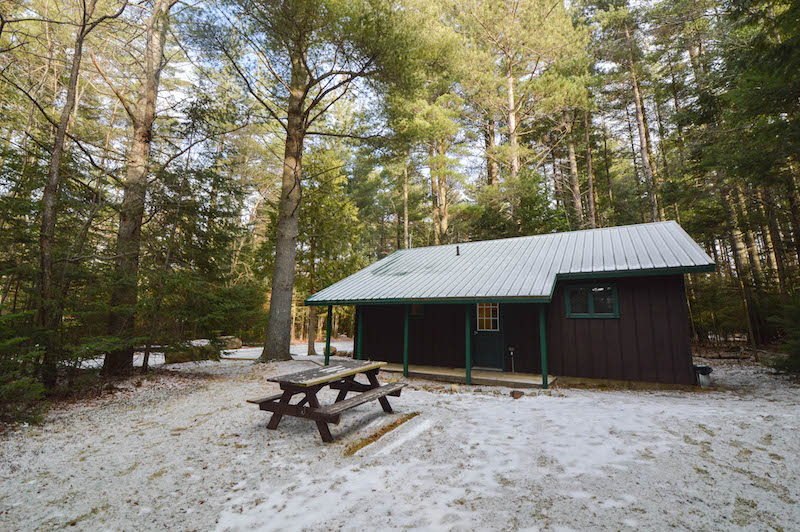
Cabin-goers can purchase dinner at the Adirondack Loj or cook for themselves. Trail advice is available at the Adirondack Mountain Club’s High Peaks Information Center, located on the same tract of land.
Nightly rates at the Tyler Cabin range from $233 to $259 for Adirondack Mountain Club members and $269 to $299 for non-members. Nightly rates for the Campground Cabin range from $161 to $170 for members and $179 to $189 for non-members. For reservations, visit adk.org/stay/heart-lake-camps/
Featured Photo by Seth Jones, courtesy the Adirondack Mountain Club. Heart Lake as seen from the summit of Mount Jo in the Adirondacks. From the lake, Mount Jo is an easy 2.2-mile round-trip hike that is great for families with kids or your first afternoon in camp.

